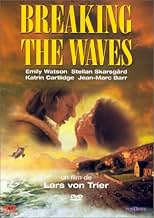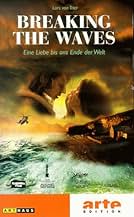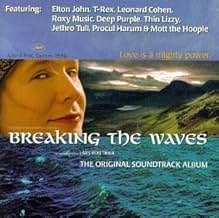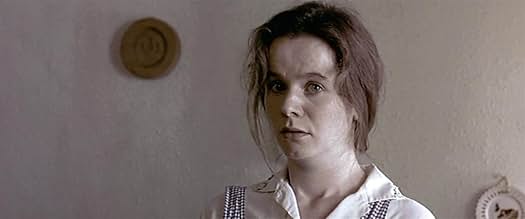Oilman Jan se retrouve paralysé après un accident. Sa femme, qui priait pour qu'il rentre, se sent coupable. Encore plus, lorsque Jan lui demande d'avoir des relations sexuelles avec d'autre... Tout lireOilman Jan se retrouve paralysé après un accident. Sa femme, qui priait pour qu'il rentre, se sent coupable. Encore plus, lorsque Jan lui demande d'avoir des relations sexuelles avec d'autres hommes.Oilman Jan se retrouve paralysé après un accident. Sa femme, qui priait pour qu'il rentre, se sent coupable. Encore plus, lorsque Jan lui demande d'avoir des relations sexuelles avec d'autres hommes.
- Director
- Writers
- Stars
- Nommé pour 1 oscar
- 45 victoires et 28 nominations au total
Finlay Welsh
- Coroner
- (as Finley Welsh)
Avis en vedette
This is the story about love. Everyday we experience this breathtaking emotion with both inanimate objects and with other souls. It is when we finally find true love that nothing else in the world seems worthy or good. We work as hard as we can to continue this warmth that we feel in our hearts when true love exists, and sometimes that means going to a level we never thought imaginable.
That is the central theme of Lars von Trier's epic, Breaking the Waves. Love has no boundaries as we watch Bess do everything possible (and more) to keep the relationship with her husband together during the roughest of times. Emily Watson controls the character Bess giving her best performance ever. The emotion and serenity that is felt, not only behind the character of Bess, but also behind Watson's eyes is phenomenal. It is not often that Hollywood is able to capture this sort of raw emotion, but Watson pulled it off with incredible talent.
Outside of Watson's character, there is the story. Lars von Trier does a spectacular job of continually building on the foundation that he has begun.
Watson is his foundation, and Trier builds this amazing world around her. In this film, everything from talking to God to reverberating stories to her husband while he is in the hospital only helps build the story to even higher heights. I will be honest; I shed tears at the end of this film. It will pull at every heart muscle that you have and really make you look at your significant other and truly feel the power of love.
This is a love story, but not like one we have seen in a very long time. I don't think we will see anything similar to this again. It will be hard for Hollywood to emulate such raw talent, groundbreaking direction, and life-changing story.
Thank you Lars von Trier for your imagination and passion for love.
Grade: ***** out of *****
That is the central theme of Lars von Trier's epic, Breaking the Waves. Love has no boundaries as we watch Bess do everything possible (and more) to keep the relationship with her husband together during the roughest of times. Emily Watson controls the character Bess giving her best performance ever. The emotion and serenity that is felt, not only behind the character of Bess, but also behind Watson's eyes is phenomenal. It is not often that Hollywood is able to capture this sort of raw emotion, but Watson pulled it off with incredible talent.
Outside of Watson's character, there is the story. Lars von Trier does a spectacular job of continually building on the foundation that he has begun.
Watson is his foundation, and Trier builds this amazing world around her. In this film, everything from talking to God to reverberating stories to her husband while he is in the hospital only helps build the story to even higher heights. I will be honest; I shed tears at the end of this film. It will pull at every heart muscle that you have and really make you look at your significant other and truly feel the power of love.
This is a love story, but not like one we have seen in a very long time. I don't think we will see anything similar to this again. It will be hard for Hollywood to emulate such raw talent, groundbreaking direction, and life-changing story.
Thank you Lars von Trier for your imagination and passion for love.
Grade: ***** out of *****
Emotional power is one of the most difficult and complex aspects of film-making to succeed in. Very few films can manage to be emotionally destructive, while still retaining the viewer's concentration and dedication to the piece. Yet, Breaking the Waves is a film that holds more emotionally power that most films, it is not a film you will want to see again. One viewing is enough (at least for a long period of time). Bearing in mind, you will feel devastated by the film's self-destructive nature and after viewing such an unforgettable story of heart ache and sadness you will have etched into the back of your mind.
Breaking the Waves is a complicated story; it is one that studies love, regret, guilt, madness and religion. Breaking the Waves is set in a small religious town deep in Scotland and tells the sorrowful story of the innocent Bess (Emily Watson) and her lover Jan (Stellan Skarsgaard). Jan becomes paralysed in a freak accident at the oil-rig he is working on and asks his estranged wife Bess to have sex with other men and then tell him what it was like to keep their relationship stable.
Lars Von Trier, the founder of Dogme film-making creates a drama that remains in a league of its own. Though Breaking the Waves is not Dogme film-making (like The Idiots) it still has elements of Dogme film-making style littered around it. The film is separated into chapters, which work as wonderful mood and symbolic transitions. These sequences are a single shot focusing on something that is considerably impressive, with the added touch of a brilliantly chosen song to fit the mood. The film's general direction is one that feels like it has been shot with a hand-held style.
The film studies many questionable elements of life, including topics such as death, terminal illness, spirituality, emotions and hypocrisy in religion. These are just a view of the talking points that crop up throughout the long running-time. The film asks the viewer questions and most importantly tests how much harrowing devastation you can handle. There is no denying just how pure Breaking the Waves is.
Emma Watson gives a career defining performance with her pitiful role of a naive young woman, who just wants to be free from pain. The performance is very painful to watch because it is so unbearably realistic. You become apart of her journey and watch her emotions and sanity spiral out of control, even from the people who love her. Heartbreaking in every way.
Breaking the Waves is a difficult film and one that is not for everyone, though I say it is a film which deserves the critical acclaim it gets.
Breaking the Waves is a complicated story; it is one that studies love, regret, guilt, madness and religion. Breaking the Waves is set in a small religious town deep in Scotland and tells the sorrowful story of the innocent Bess (Emily Watson) and her lover Jan (Stellan Skarsgaard). Jan becomes paralysed in a freak accident at the oil-rig he is working on and asks his estranged wife Bess to have sex with other men and then tell him what it was like to keep their relationship stable.
Lars Von Trier, the founder of Dogme film-making creates a drama that remains in a league of its own. Though Breaking the Waves is not Dogme film-making (like The Idiots) it still has elements of Dogme film-making style littered around it. The film is separated into chapters, which work as wonderful mood and symbolic transitions. These sequences are a single shot focusing on something that is considerably impressive, with the added touch of a brilliantly chosen song to fit the mood. The film's general direction is one that feels like it has been shot with a hand-held style.
The film studies many questionable elements of life, including topics such as death, terminal illness, spirituality, emotions and hypocrisy in religion. These are just a view of the talking points that crop up throughout the long running-time. The film asks the viewer questions and most importantly tests how much harrowing devastation you can handle. There is no denying just how pure Breaking the Waves is.
Emma Watson gives a career defining performance with her pitiful role of a naive young woman, who just wants to be free from pain. The performance is very painful to watch because it is so unbearably realistic. You become apart of her journey and watch her emotions and sanity spiral out of control, even from the people who love her. Heartbreaking in every way.
Breaking the Waves is a difficult film and one that is not for everyone, though I say it is a film which deserves the critical acclaim it gets.
Lars von Trier's Breaking the Waves is the kind of film that makes me proud to be a film-goer and exceeds anything I could have possibly expected from the man who made Element of Crime. That film had some clever experimentation (and so does this one) but this film is the kind that's beauty and power echoes in your mind hours after you've watched it. This is a flabbergasting work of art that portrays a woman's quest to please God and does so with the complexity and emotional power of a Bergman film (not to mention the fact that the film portrays a woman's intense suffering in world sternly ruled by men with the power of a Dreyer film). If von Trier made nothing else of any merit for the rest of his career, if all he did was make marginally interesting film experiments, I wouldn't hesitate to call him a great filmmaker on the soul basis of this film. Anyway, you get the picture
The film stars Emily Watson as Bess, a shy and neurotic girl who is filled with joy to be with her new husband Jan (Stellan Skarsgard who is exceptional). When Jan is paralyzed after an accident at the oilrig he works in, he is in danger of losing his life. He convinces Bess to see other people and Bess wants nothing more than to make him happy and to prove to God that she loves him. After some disastrous complications, Bess is led to believe that she can please God and save Jan's life by having numerous sexual encounters with strangers in town. This sounds like a grungy tale, but von Trier tells it with such humanism and focus on his themes that we never feel like he is rubbing our faces in drear. And Watson is delightful, frightening, and heartbreaking as a woman who will stop at nothing to please those around her. Her one-sided conversations with God (in which she looks up in the air submissively and pleas and then looks down with a deep voice of wrath and scolds) are both funny and sad, not to mention the fact that they reveal seemingly endless amounts of details about who she is. The film is made with a hand-held camera and a visually stunning solarized style. This style does not make the movie; it just adds richness to each scene in the way it gives each face such shadowy texture. In the end, von Trier seems to believe in God but does not believe in the churches that try to codify what he wants. All of this works because of von Trier's passionate desire to understand how one can please God under horrendous terms; the epilogue, that takes the already-great material to a new level and shows how inspired von Trier is, starts with a moment of sad irony and then leaps to the skies with an image that fills the most atheistic person with questions and the more religiously spiritual people with hope. Here is a film that reaches for the stars and makes it there.
The first time I saw Breaking the Waves, I was astonished that Emily Watson had not acted for the cinema before her turn as Bess McNeill. What she brings to the role of the naive Scottish girl offers a clinic on superlative acting that could humble veterans with ten times the experience. Another thing that makes this film so special is that it never backs away from its vivid and mature examination of love, commitment, and aspects of the metaphysical. I easily class this work as one of the top films of the 1990s. Director Lars von Trier is a true visionary, and the (largely hand-held) cinematography by Robby Muller perfectly defines the tone of the film -- in fact, the theatre where I saw Breaking the Waves posted a disclaimer that warned anyone who suffers from motion or sea-sickness to see the film at their own peril!
I just finished watching "Breaking the Waves" and am still not sure whether it was a good film or a strong piece of manipulation. Perhaps there is ultimately no difference.
Emily Watson was luminous and altogether convincing, and the camerawork didn't bother me in the slightest. On the contrary, it suited the story immensely - as did the deliberately washed-out palette. A brilliant invocation of a time and place.
However, the story left me feeling like I'd just watched someone kicking a puppy ... for several hours. I dislike the implication that such brutal and violent self-sacrifice can be justified by intense love, and to have this line wrapped up in a dewy religious shroud is a cop-out. It's like watching a documentary about the horrors of sideshow life - with plenty of explicit segments starring the freaks themselves. Allows an audience to moralize and yet be voyeurs at the same time.
Poor Bess was more than naive - whatever brain she was born with was utterly starved of oxygen by the narrow and restrictive community she was born into. I sympathized most with Dodo, who of them all loved Bess the most, and the least selfishly.
I find myself very angry after seeing "Breaking the Waves", which is why I cannot say that I disliked this film. Had I truly disliked it, my response would be less emotional.
Emily Watson was luminous and altogether convincing, and the camerawork didn't bother me in the slightest. On the contrary, it suited the story immensely - as did the deliberately washed-out palette. A brilliant invocation of a time and place.
However, the story left me feeling like I'd just watched someone kicking a puppy ... for several hours. I dislike the implication that such brutal and violent self-sacrifice can be justified by intense love, and to have this line wrapped up in a dewy religious shroud is a cop-out. It's like watching a documentary about the horrors of sideshow life - with plenty of explicit segments starring the freaks themselves. Allows an audience to moralize and yet be voyeurs at the same time.
Poor Bess was more than naive - whatever brain she was born with was utterly starved of oxygen by the narrow and restrictive community she was born into. I sympathized most with Dodo, who of them all loved Bess the most, and the least selfishly.
I find myself very angry after seeing "Breaking the Waves", which is why I cannot say that I disliked this film. Had I truly disliked it, my response would be less emotional.
Le saviez-vous
- AnecdotesTheatrical film debut of Emily Watson. She received an Oscar nomination and was expelled from the School of Economic Science (the alleged cult she was brought up in) for her role in this film.
- GaffesThe film is set in the early 1970s, but the van featured prominently in the car park and heliport scenes is a mid-1980s Freight Rover 200, formerly known as the Leyland Sherpa.
- Citations
Dodo McNeill: Not one of you has the right to consign Bess to hell!
- Autres versionsThe director's cut of the film, featuring explicit shots removed from the U.S. version for ratings purposes, is available on Criterion laserdisc.
Meilleurs choix
Connectez-vous pour évaluer et surveiller les recommandations personnalisées
- How long is Breaking the Waves?Propulsé par Alexa
- This is 1 of 3 movies in a series, Breaking The Waves, Dancer In The Dark, and which other?
Détails
- Date de sortie
- Pays d’origine
- Langue
- Aussi connu sous le nom de
- Breaking the Waves
- Lieux de tournage
- sociétés de production
- Consultez plus de crédits d'entreprise sur IMDbPro
Box-office
- Budget
- 42 000 000 DKK (estimation)
- Brut – États-Unis et Canada
- 3 803 298 $ US
- Brut – à l'échelle mondiale
- 3 831 182 $ US
- Durée2 heures 33 minutes
- Couleur
- Mixage
- Rapport de forme
- 2.35 : 1
Contribuer à cette page
Suggérer une modification ou ajouter du contenu manquant

Lacune principale
What was the official certification given to L'amour est un pouvoir sacré (1996) in Japan?
Répondre




























